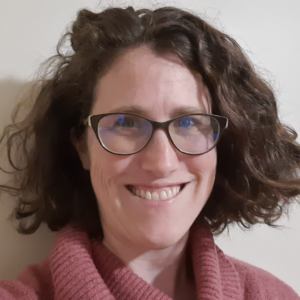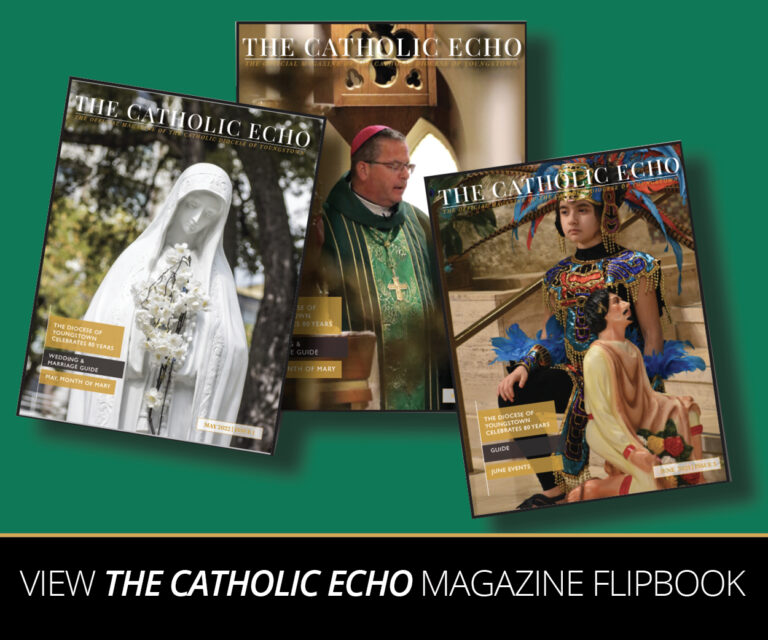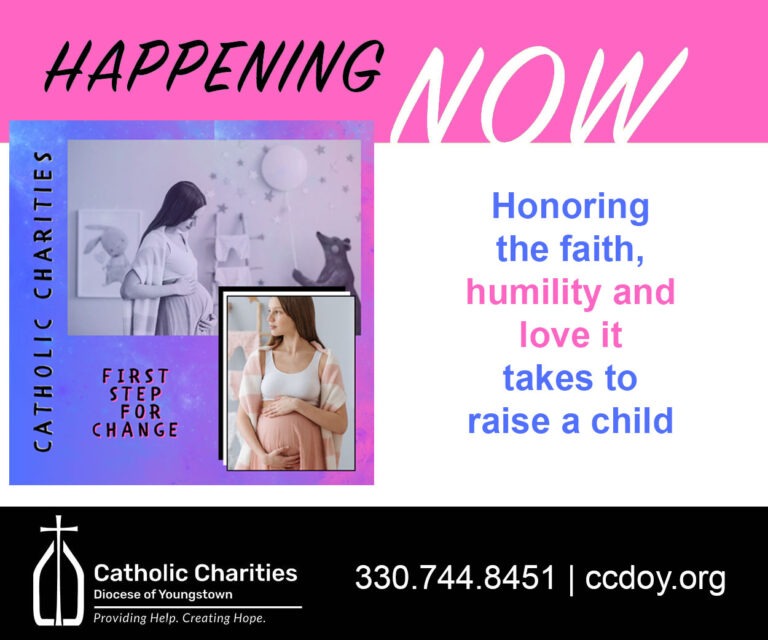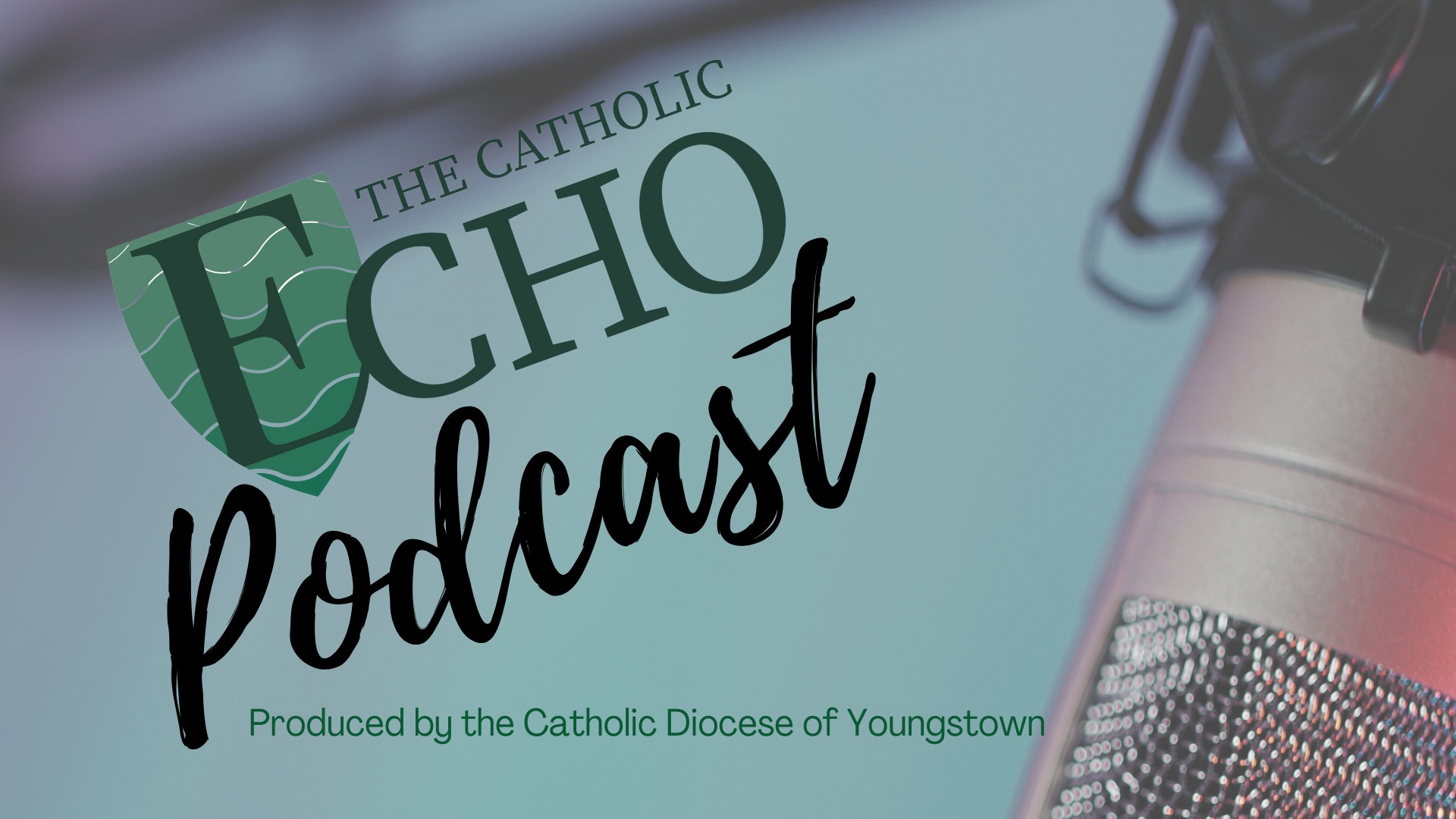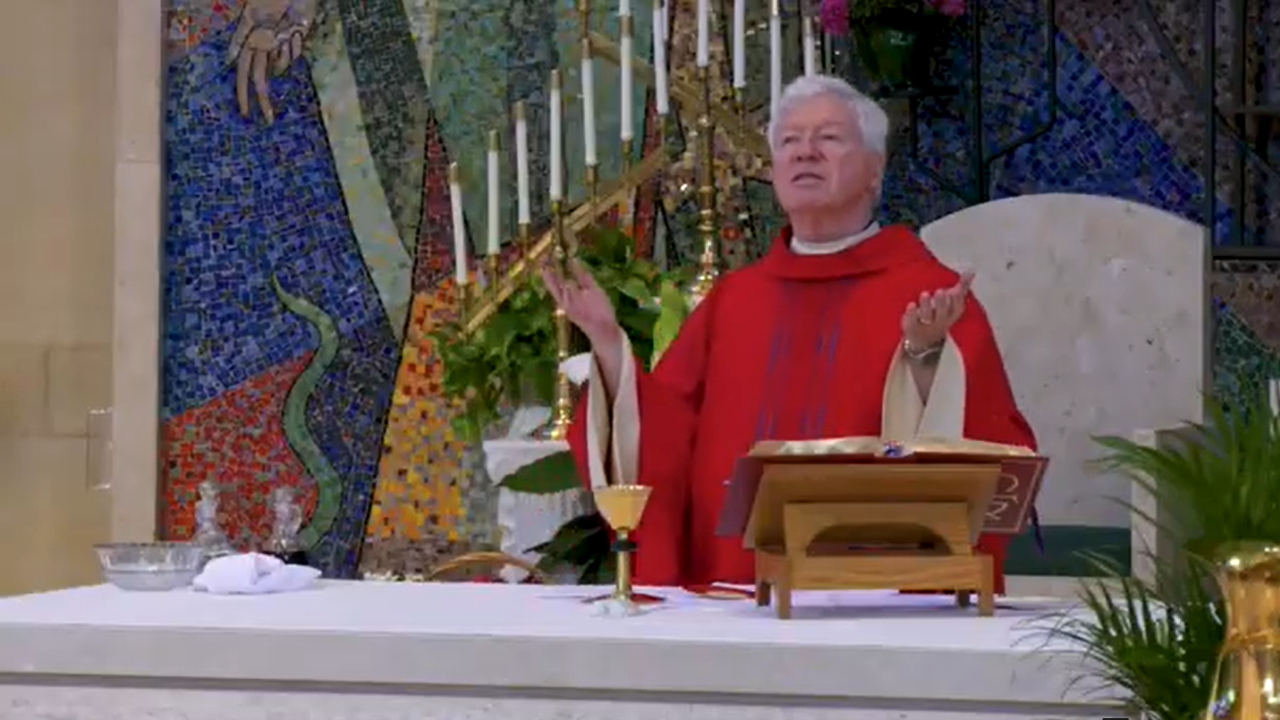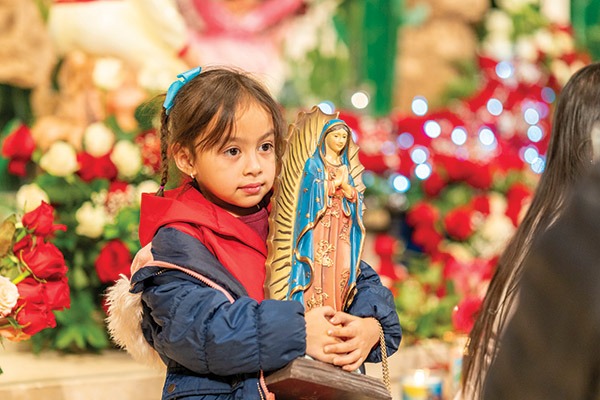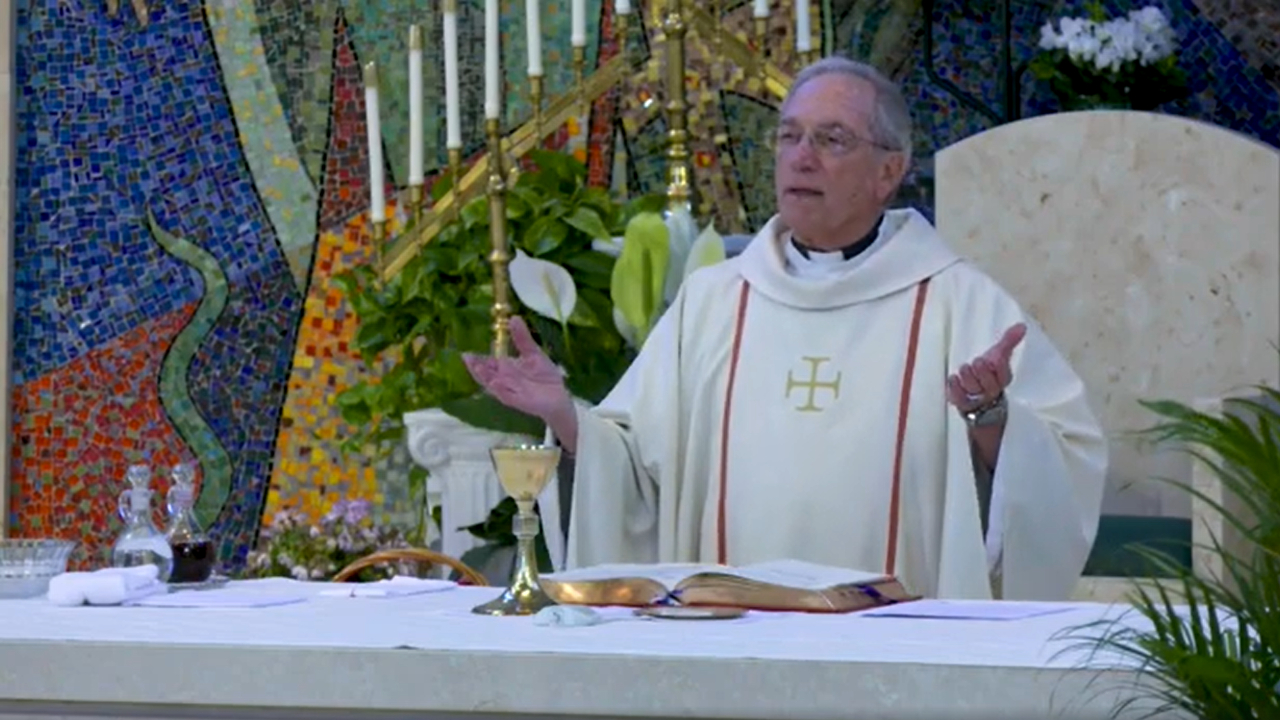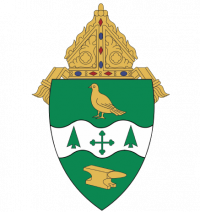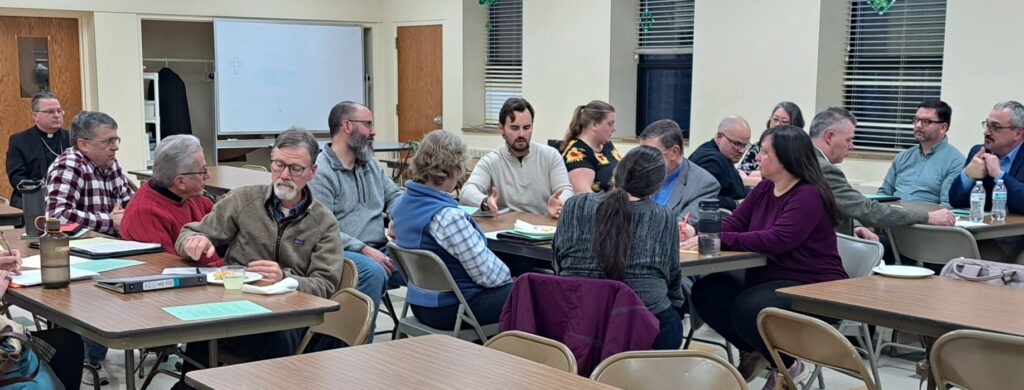
On Monday, March 11, representatives from fifteen parishes and collaborations in Portage and Stark counties gathered in the Regina Coeli Parish Hall in Alliance to share their hopes and concerns for the Church.
Participants shared positive stories about parishes working well together while preserving their buildings, and the energy brought to parishes when welcoming immigrants. Others expressed concerns about inconsistencies in Catholic media and preventing burnout for those in ministry.
This session was the second of three listening sessions to gather input from parish leaders and parish council members. For details on the Synod process and responses from the first listening session, please read “Synod Listening Session | Mahoning & Columbiana” by Mary Ellen Pelligrini. Priests, deacons, and lay parish council members sat in small groups to discuss reports from their parishes.
The topics were two follow-up questions from the ongoing Synod on Synodality:
- Where have I seen or experienced successes and distresses within the Church’s structure(s)/organizations/ leadership/life that encourages or hinders the mission?
- How can the structure and organization of the Church help all the baptized to respond to the call to proclaim the Gospel and to live as a community of love and mercy in Christ?
As the diocese’s representative to the Worldwide Synod, Monsignor John Zuraw facilitated the listening session. The group starting with a prayer to the Holy Spirit before small group discussions of the two questions. After the conversation, a representative from each table reported back on their conversation to the large group. Bishop David Bonnar was also present to listen and respond to questions.
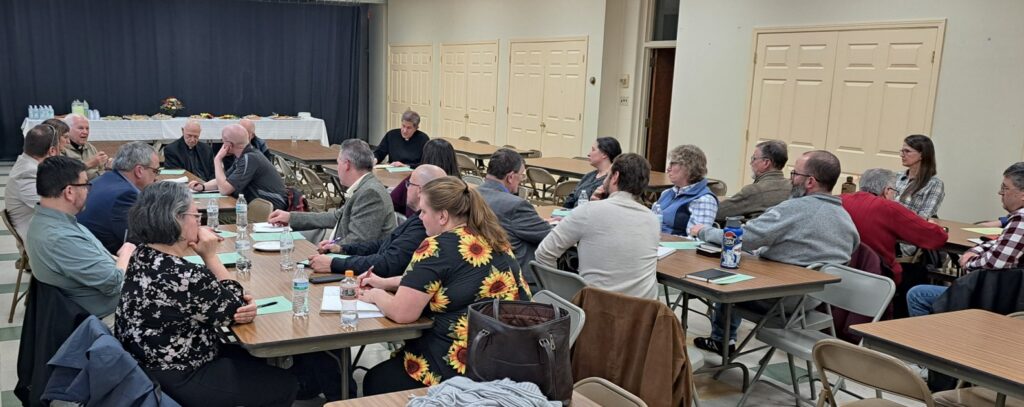
Monsignor James Clarke shared the positive results of a shared “Prayer for Collaboration” said at every Mass at the Basilica of St. John the Evangelist and St. Peter Parish in Canton.
Ross Bradley, a parish council member from the collaboration, later shared that he feels that parishioners are well prepared for the upcoming merger, as the prayer will simply be renamed a “Prayer for Our Parish.” Their two parishes already have a shared Mass schedule, bulletin and other ministries. In addition, even when parishioners attend Mass at another location, they can indicate in the offertory which church location they wish to support, and both historic buildings have adequate funding for maintenance.
Other successes mentioned were the energy that has come from welcoming immigrants and young families, parishioners stepping forward to meet specific ministry needs, and respect for religious sisters who minister in the parish.
“We are so appreciative of our priests, of you, Bishop, and leadership at the diocese, for all you do to serve,” expressed Mario Calandros, pastoral associate and Religious Education director from St. Louis Parish and Sacred Heart of Mary Parish in Louisville. Calandros empathized with the challenges of leadership, based on his work with leadership in different contexts, and shared a common feeling of appreciation for the difficult decisions that need to be made at the diocesan level.
Distresses discussed at the listening session were often similar to the success stories. Examples were religious who did not trust parishioners with ministry or competition between Catholic churches over Mass times, even from other dioceses. Other concerns included inconsistencies between priests on matters such as their knowledge of finances or policies on who can be baptized.
Even these distresses came with hopeful brainstorms. “Perhaps every parish could have a business manager,” suggested Calandros. “That is one way lay people can provide administrative expertise and support our pastors.” In general, participants shared their pastoral concern about the workload on priests, deacons, religious and lay ministers trying to serve multiple communities.
In the larger Church, some shared the difficulties with confusion over mixed messages in the media about Catholic teaching or ministry. Participants did not disagree with Pope Francis’ actual teaching, but rather with conflicting messages from unofficial Catholic media, or just a general lack of knowledge among people in the pews. Questions were raised about what could be done to increase awareness or of official sources of Catholic information.
“The general public reads at an eighth grade level or below,” explained Marlena Lewandowski, a middle school teacher representing Our Lady of Perpetual Help Church in Aurora. “Even these questions tonight are written at a higher grade level than that. Sometimes people just don’t understand what they are reading or hearing.”
Monsignor Zuraw explained that the questions were translated from Italian, and understood the difficulties that can arise from translating into different languages and cultures.
There was a general enthusiasm in the room after hearing so many success stories and positive suggestions for improvements.
“If we hear ideas from these sessions, are we empowered to go back and act on them?” asked Ross Bradley from Canton.
“Certainly, talk to your pastor and share your ideas,” responded Bishop Bonnar. “We are all going to have to change in order to grow, and that sense of mission is what gets me up in the morning and keeps me going.”
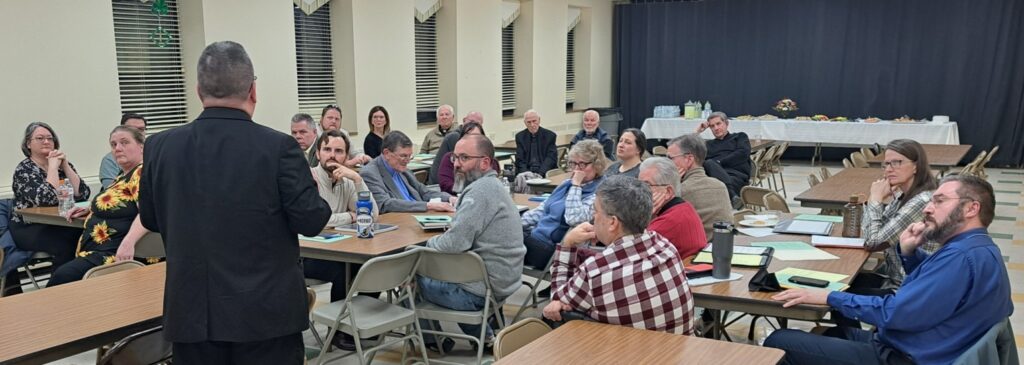
“We also have information coming in from personal inventories of all priests through the Catholic Leadership Institute,” continued the Bishop, “and parishioner responses to the Disciple Maker Index surveys. The vision of the parish today is very different for me and my fellow priests than what we grew up with and what we were trained for, collaborations and all the rest, but we can’t keep doing things the way we always have and still meet the needs in our world today.”
“That sense of community is so important,” reflected Bishop Bonnar. “We have to stop focusing on buildings and Mass times, and instead turn our focus to the community.”
“That sense of mission is what gets me up in the morning and keeps me going.”
Bishop David J. Bonnar
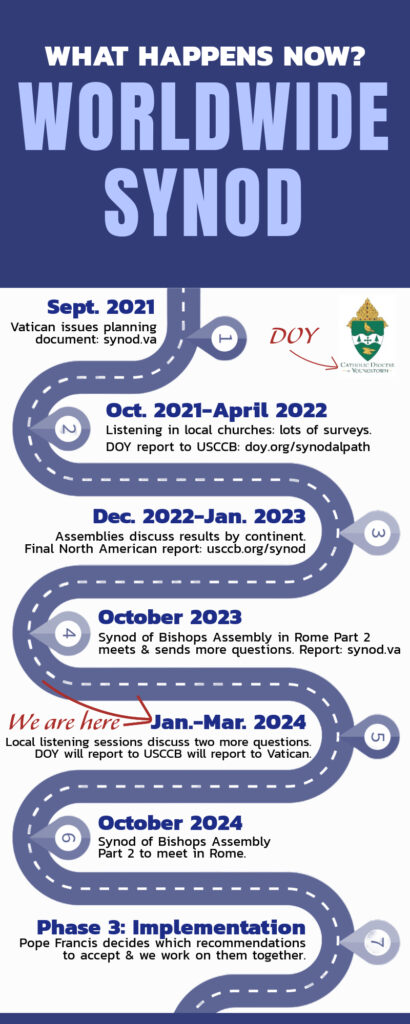
Other questions were raised about the Synod itself.
“Monsignor Zuraw, what happens next?” asked Monsignor James Kolp, a retired priest from the Diocese of Youngstown. “And how can we help people in the pews understand what a Synod is?”
Monsignor Zuraw explained that after a series of listening sessions involving representatives from all six counties, Central office staff, the Presbyteral council and Administrative Board, the diocese will send a summary to the U.S. Conference of Catholic Bishops (USCCB). The USCCB will compile reports from across the country to send a report in preparation for the Synod of Bishops who will meet in Rome in October 2024. Monsignor Zuraw concluded the evening’s session by thanking the hosts at Regina Coeli Parish for their hospitality, and all the participants for their time and dedication.
What is a Synod?
A Synod is a type of assembly. In the Catholic Church, a Synod gathers people together physically and spiritually to address a specific issue. We believe that the Holy Spirit guides our communities through conversation, even debate. A Synod maintains relationships and unity through our willingness to listen to each other as we discuss difficult topics.
In some Christian denominations, a Synod acts as a democratic legislature, voting on proposed changes to church law or policy. In the Catholic Church, the Pope has the final authority to make decisions.
A Synod helps decision makers-such as a pastor, bishop or the Pope-to listen to the faithful about how they see God acting in our world. There are many ways to listen, and many difficult topics to discuss.
Right now, the global Catholic Church is discussing what a Synod should look like. This is called the Synod on Synodality, in process now. Pope Francis has asked Catholics to talk about how we listen to each other at all levels of the Church, and how that is shared from local parishes up to the Vatican. The goal of all the Synod surveys and listening sessions from 2021 to 2024 is to bring people together to build relationships and community.
